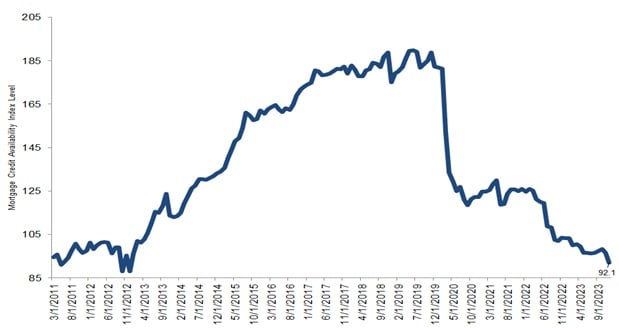Demand for purchase loans picked up last week as would-be homebuyers took advantage of rates that are still a full percentage point lower than 2023 highs, MBA lender surveys show
After two months of declines, mortgage rates are starting out the new year on a gentle ascent, and mortgage lending standards are tighter than they’ve been in a decade.
But demand for purchase loans still picked up last week as some would-be homebuyers put the holidays behind them and decided to take advantage of rates that are still a full percentage point lower than 2023 highs, according to a weekly survey of lenders by the Mortgage Bankers Association.
The MBA’s Weekly Mortgage Applications Survey showed demand for purchase loans was up by a seasonally adjusted 6 percent last week compared to the week before, but down 16 percent from a year ago. Requests to refinance jumped 53 percent week over week and were up 17 percent from a year ago, when most homeowners had little incentive to refinance.
“The increase in purchase and refinance applications for both conventional and government loans is promising to start the year but was likely due to some catch-up in activity after the holiday season and year-end rate declines,” MBA Deputy Chief Economist Joel Kan said in a statement Wednesday. “Mortgage rates and applications have been volatile in recent weeks, and overall activity remains low.”
In a separate report, the MBA said Tuesday that mortgage credit availability declined in December to the lowest level since 2012. Kan said that trend is driven by industry consolidation, which has resulted in more loan programs being removed from the marketplace.
Mortgage rates climb in the new year
At 6.68 percent Tuesday, rates on 30-year fixed-rate conforming mortgages were up slightly from their recent low of 6.56 percent, registered on Dec. 27. But that’s still more than a full percentage point lower than the 2023 peak of 7.83 percent seen in late October, according to loan lock data collected by Optimal Blue.
In a Dec. 12 forecast, MBA economists projected rates on 30-year fixed-rate loans will drop to an average of 6.1 percent during the fourth quarter of 2024, while Fannie Mae economists expect a less dramatic decline to an average of 6.5 percent by the final three months of the year.
A record number of consumers surveyed by Fannie Mae in December said they expect mortgage rates will keep falling this year, a “significant shift” in expectations that could free homeowners from the so-called “lock-in effect,” Fannie Mae Deputy Chief Economist Mark Palim said Monday.
How hard and how fast rates come down is likely to depend on future economic and employment data, which will help Federal Reserve policymakers decide whether inflation is continuing to ease. They’ll also be keeping an eye on whether there’s a danger that the economy is slowing too quickly and could tip into a recession.
Yields on 10-year Treasury notes, a useful barometer for where mortgage rates are headed next, have been on the rise as the latest economic data shows the U.S. economy is still growing, reducing the odds that the Fed will cut rates soon. Economists polled by Reuters think 10-year Treasury yields will stay about where they are until June, which would mean mortgage rates would also remain static through the spring homebuying season.
Marty Green, principal of mortgage law firm Polunsky Beitel Green, said that despite the recent trend, he still expects mortgage rates to decline by 1.25 to 1.50 percentage points over the next year.
“While we see interest rates going down fairly significantly, we see them falling mostly like a tennis ball going down a flight of stairs,” Green said in a statement. “They will generally be going down, but we see unexpected bounces along the way. There will be data points that will revive fears about inflation or other information, making markets question the pace of the Fed’s rate reductions.”

The MBA said Tuesday that its Mortgage Credit Availability Index (MCAI) fell by 4.6 percent in December, to 92.1, indicating that mortgage lending standards are tighter than they’ve been in more than a decade.
Kan said standards tightened for both conventional mortgages eligible for purchase by Fannie Mae and Freddie Mac and government-backed FHA and VA loans. The tightened standards for government-backed mortgages were driven by lower investor demand for renovation loans and streamlined refinance loans, Kan said.
While MBA data shows lenders are tightening, 43 percent of consumers surveyed by Fannie Mae in December said they thought it would be easy to get a mortgage, up from a 2023 low of 40 percent in September.
Source: inman.com











